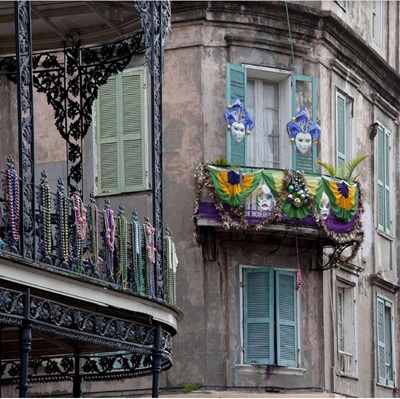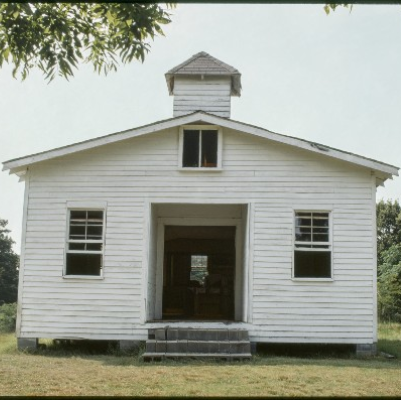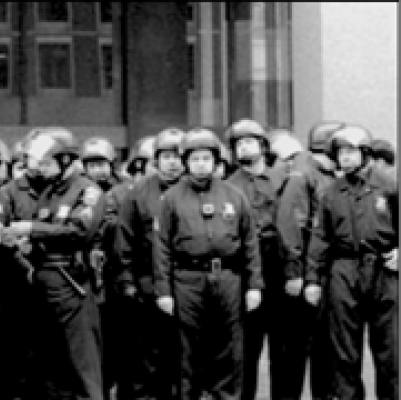“The Horn: Whispers of eternity in F major” by Mi West, was a runner-up in our 41st Short Fiction Contest. It is published with the permission of the author.
The Horn
Whispers of eternity in F major
by Mi West
___
Some lives turn out healthy and long, some more fulfilled than long. Bro was sick and much older. He passed away last spring, so his voice sounds both new and familiar to me, as it whispers,
“Go to my place and visit my old room.”
“Why?”
“I’ll let you know.”
An ascending airliner outside wakes me up, and I realize I was dreaming. I’m still yawning as I look up a weekend bus, but the online timetable shows more blanks than connections.
It’s dry September weather, so I grab my key to his door, fill up my water bottle, and make this a bike trip in heat haze instead, like the sixty-four mile trips of our teens. The Beatles’ “When I’m Sixty Four” wasn’t our bag, but the number was. He agreed that ‘feel eight’ times eight was a funny jazz jerk for our feet, although they were no organ-player feet, be eight beats or eight miles.
I beat him in the final spurt every time. He argued his adult muscles were better in endurance than in sprints, but he didn’t care, because music was what counted; I was a kid who owned a Fender bass, but he was a tall wiz and academy student whose life was already jammed with woodwinds.
I’m still addicted to the whisper of narrow racer tires licking the asphalt; it goads the legs, while soothing the mind into a natural meditation.
My bottle empty and my mind open, I arrive emptied of lumber and sorrow. My key still fits, and his room looks as always: Shelf after shelf of music books, sheets, and records; all in place, as if order still made sense. Only silence and stale smell betray absence—of tones, life, meaning, and human dealings. I inhale the contrast to the superabundance of weekend oxygen along my way, not to mention contrast to the breeze of woodwind vibes that permeated this house when Bro was alive.
I glance at a settee full of worn woodwinds; a stand in front of it supports his pet gem: A large, well kept, black-and-silvery basset horn tuned in F major. I try to make a tone, but the reed is already drying out.
I do some thigh stretches, before I sink into his armchair. As my eyes absorb the horn’s saxy shape, my mind’s ear hears its silky timbre from the past.
I do another stretch. When I release and relax, the sound in my mind suddenly resembles human words.
“I want you to travel to Prague,” a silky whisper seems to say.
“Why? Is this yet another one of your music pranks, Bro?” I wonder.
His musician jokes were Mount McKinley level; far more inventiveness than ground contact. You were supposed to have something like a PhD in musicology and logic, to figure out his point.
“Don’t worry. I’ll let you know.”
“I guess God still has humor, although you’re no longer here.”
“Sometimes he does.”
“That’s why he likes major keys, such as F major… Can I afford the ticket?”
“Check British and Nordic low-costs as soon as you’re online.”
I no longer hear the echo. I ride back wondering if it was a message or a freak of mind. Tailwind gets me home much faster than usual. After all, Prague is worth quite a few clicks. Why not.
A search returns an overseas low-cost Dreamliner with one seat left, departure next morning; a bargain at a price of a two-week subway pass.
“Buy,” the soft voice from my dream whispers.
“Sure.”
I receive my ticket in a minute.
I decide to travel light: I scrape together my toothbrush, card, phone, passport, and PJ. My small backpack will do.
* * *
I check the bus departures at Václav Havel Airport. The voice from my dream comes back.
“Take a bus to the subway. The manor —remember we went to their concerts before— is just a short walk from Metro line B. It’s the same station as before; just renamed right after the Velvet Revolution. I’m sure you remember how you get there.”
“Come on, what’s the point? The manor’s been closed for concerts for ages…”
“This is more than a simple prank, don’t worry. They’ll let you know.”
* * *
As I walk from the subway, past a pall-mall of functional style, Art Nouveau, and new shopping malls of glass, I realize I would find my way even blindfolded; been here many times with Bro, sometimes with enthusiasm and sometimes with reluctance. The picture in my mind is so distinct it slides into a daydream.
The shopping malls, hotels, and office blocks melt into tumbledown factory walls, their bricks glaring at me through cracked plaster. The street gets dusty of grime, and the air stinks of coal. The streetcars get shabby and worn out, squeaking most of the time.
Back in my teens, Prague is anything but velvet, and this street is anything but fashionable. I happen to meet some folks outside the manor in the intermission of a classical concert, and they turn out as musicians of the Other culture; always in dissonance with the omnipresent official big-fat-sickle-and-hammer liturgy (by Russian preachers of holy Lenin.) Secret commie cops are unsurprisingly close on their heels.
In this city, music is history in the making—again. Creative minds are moving underground—again. The jazz section of the composer union is dispersed. Bands like The Blue Effect are forced to change their names or to quit music. Some bands accept none of it, and face prison sentences for their concerts; young lives forced to postpone the whole get-a-life thing until the times of freedom in a hazy faraway future. That’s the Wild East flavor of living the blues. Prosecutors treat the constitution as rubber allowing for a zillion possible twists. Plasticine law and straitjacket order make jazz, rock, and blues a minefield, where you’re constantly watching your step.
Even pure instrumentals have subversive connotations: Freedom Jazz Dance, Battle Hymn of the Republic, Dance of Maya… They make an ever growing list of State-defaming sins. Māyā happens to mean delusion in Sanskrit, which gives it an air of sly subversive encryption; extraordinarily aggravating circumstances are Mahavishnu’s American double-neck Gibson, plus the fam undanceable time signature—a shuffle in 10/8. Not to mention a sky-climbing, Mozart-orgasmic grande finale that makes any not-completely-deaf censor hit faster than Billy Cobham’s drumsticks.
The growing presence of red flags (in both respects,) red slogans shooting their mouth off, and red-tape nonsense, is proportional to the growing absence of blue notes in concerts that are blessed with a legal permission.
This district of Prague has a baseline of dissent. Secret cops give coffins as “presents,” or rather ultimatum, to a couple of guys here: Either quit the underground and the Charter 77, or the presents come in handy to those you’ll leave behind…
After our intermission chat outside the manor, I have to wait until the Velvet Revolution of 1989 for my next entry visa; quite common, according to classical musicians Bro visits here, in secret, in the meantime.
As I turn uphill toward the manor, my mind slowly turns back to present time. Streetcar noises make a decrescendo. The sidewalk gets cleaner. The air smells of maple and gardens again.
I remember Pussy Riot sitting in a forced-labor camp, and the Russian establishment getting away with it; I’m sure those who sign the long round robin in downtown Prague do remember what censorship was like. I send immense sympathy to the prisoners and to my co-signers. Those magical, sky-climbing bars of Dance of Maya, still reverberating in my mind, strengthen it further: Let them melt the iron bars that keep those youngsters and mothers from their freedom, children, and loved ones. The soft voice from my dream whispers to me again,
“Sure; count on me, Bro.”
“I do; and on ancient wisdom, too: ‘Just as water in the ear is drawn out again by water…’ the Hevajra Tantra read.”
“Keep a lookout for any good bar-melting signs tonight and on your way back.”
* * *
Talking of an air of artful encryption, today’s manor trip feels artfully encrypted, too: Dumbfounded, I see the garden gate is wide open. Festivity lights are pouring solemn atmosphere all over the place, and I’ve no idea what it means. I walk from the gate across a rhododendron shadow and past some flower beds, toward the entrance. I step inside.
The reception desk is a nice antique, the same one as in the old concert-venue days.
“Can I help you?” a receptionist says.
“Maybe; to my understanding, you no longer arrange concerts. Why is it?”
“You’re right, by and large. It’s mainly because of a new ownership. However, we keep Open house today. Tag der offenen Tür. Den otevřených dveří. Admission free.”
“Oh, an anniversary with a Czech connection, maybe? Mozart? Dvořák? Haydn?”
“Not exactly. Today is the Day of Europe’s Heritage. Cultural monuments throughout the Union, that remain closed to the public all year, are open for only one day. You’re on time.”
“If it were Easter today, I might believe I’ve entered a treasure cavern in an old Good-Friday fairy tale…”
“You might have entered one figuratively; you never know…” She twinkles.
“When was the last concert here?”
“Four years ago.”
“Have they ceased for good?”
“Almost, but tonight will be an exception.”
“Tonight! What’s on the program?”
“We’re finalizing the handouts at the moment, but you can expect a lot of Mozart all over the city…”
Bro took me here so many times, because Mozart enthralled him. Mozart’s woodwind music has close ties to Prague.
“Several of his arias,” the receptionist adds.
That’s a turnoff warning. Although a Mozart freak fostered by Bro, I’m no opera-marathon fan at all. But, the voice from my dream keeps coming back.
“Don’t be picky. Give it a try, just to hear and see what happens,” it says in pianissimo.
“Can I buy a ticket from you right away?” I ask the receptionist, in a voice that no longer feels like mine.
“You get one now. Here we go. Admission free, no strings attached. The point is to enliven these buildings the way they were enlivened in the past.”
“Which —amid vibes like these— means music…”
“Goes without saying.”
* * *
I take a seat and look around. The audience looks local and authentic, with no tourist-trap airs whatsoever: Musicians, historians, music-archive nerds with strong glasses, Mozart detectives with strong opinions, critics with lobbyable opinions, and anything in between.
A musicologist introduces the program,
“As this particular audience no doubt knows, Mozart wrote a wealth of arias. Yet this is the only one he marked ‘con corno di bassetto obbligato,’ that is, with a mandatory basset horn, an instrument he found fascinating. Later, he made this rondo part of K.621, which was his second Prague oper…”
He mentions Bro, but the words fade out into a haze while an echo reminds me,
“This is more than a prank, don’t worry. I know you’re not that much into arias, but you might remember the name of K.621, Mozart’s last opera…”
“La clemenza… di… a guy too many years ago, whose name I knew way too many years ago.”
“You’re close. La clemenza di Tito. The Clemency of Titus. First-performed in Prague, in 1791, a couple of months before he died…”
Half the program is woodwind chamber music, and my mind is soaring. Finally, I hear the musicologist introduce the last item,
“It’s fair to say that the clarinet and the basset horn were the instruments that enthralled Mozart the most.”
“…and me too, little brother, for a lifetime plus a little more,” an echo whispers in my mind.
“Therefore, we’ll finish the concert with K.580b. Enjoy the allegro for clarinet, basset horn and strings, in F major,” the musicologist says. I dissolve in Bro’s pet tones.
The woodwind guys add a Duo for two basset horns, K.487, as an encore. After a standing ovation, the receptionist thanks the enthusiastic audience, and reminds us, “Remember you were in luck; please note we’re closing the building for a long and unpredictable period of reconstruction.” A hill closing back to hide a cavern in an old Good Friday tale, if this weren’t September…
“Luck is just the middle initial, little Bro, as is treasure cavern,” the echo whispers while I cross the garden again.
“Mozart became the first guy ever to write his own funeral music, right?”
“Yes, the Requiem.”
“So you arranged yours in memoriam; that’s pretty much his way…”
“When you said yesterday it was a prank, you were wrong saying it was my prank, though. And it was later than the eleventh hour; the time window was no more than one evening, out of eternity.”
“Lucky me, having grabbed the last seat to Prague, then.”
“I’m super happy you came to listen. Thank you so much, and have a safe trip home the day after tomorrow, little Bro.”
“Thank you for a lifetime of rare extraterrestrial pranks. I’ll miss them, and I’ll miss you. Forever. Farewell, Bro.”
* * *
In the lineup after landing, I glance on the sly at headlines in bold on somebody’s pad. She scrolls a couple of news items down, and starts reading.
I can distinguish the first two lines. I draw breath. They read, “Alekhina and Tolokonnikova of Pussy Riot to be released this year. Leaks say parliament approves clemency.”
_____











































